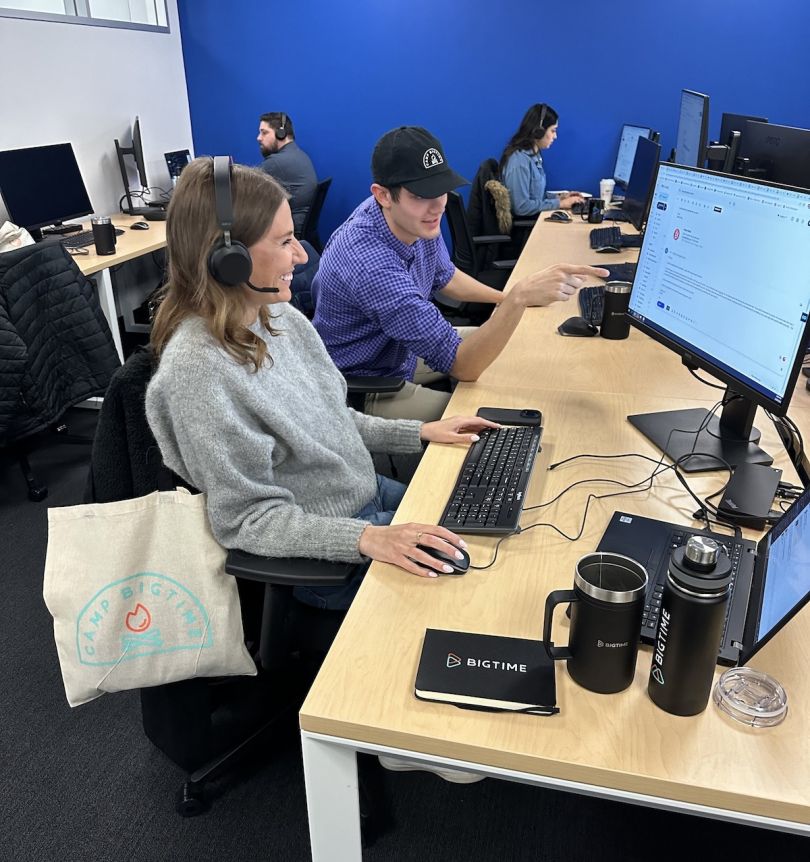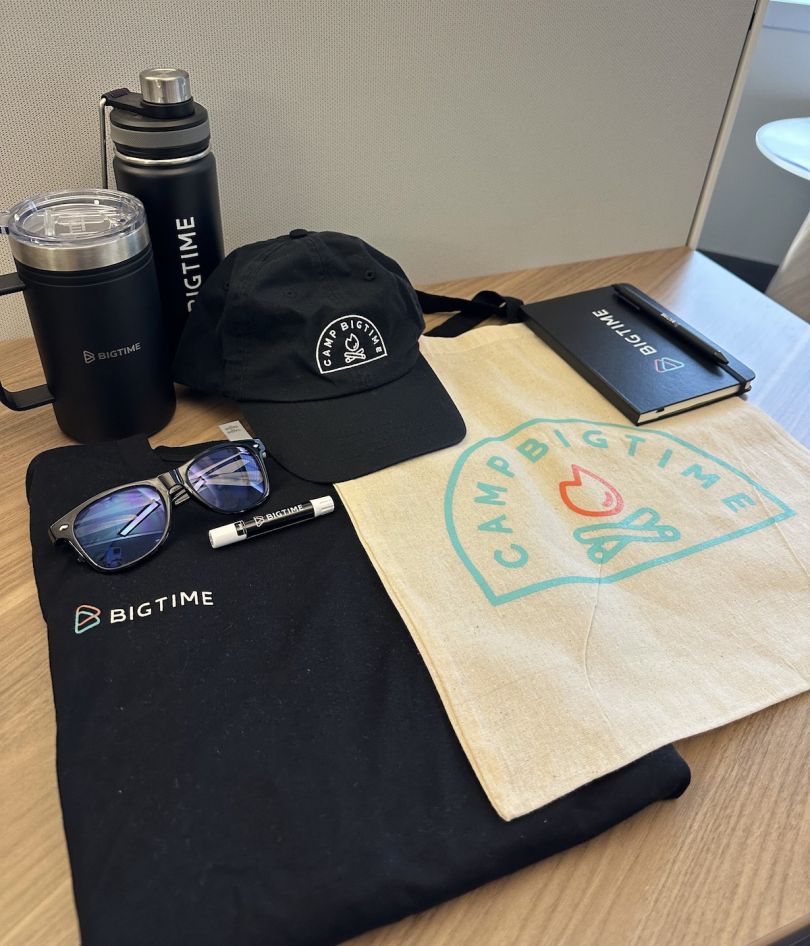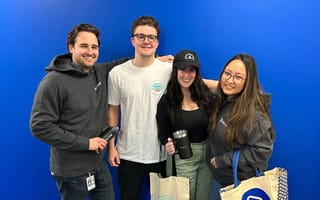“There are three really stressful life moments in life — getting married, having a baby and starting a new job.”
That’s according to Lauren Hill, senior manager of learning and development at BigTime.
The first day at a new job can be exciting, daunting and overwhelming. Throw in anticipation and all there is to learn. New hires might not be sure how to get into the building, where their desk will be or who they’ll meet on the first day.
Not at BigTime, thanks to the company’s robust onboarding program.
Onboarding starts the day candidates sign their employment agreement with the company. Soon after, their managers reach out to check in with them and answer preliminary questions. The people team maintains a clear communication loop to ensure on the first day, new hires know exactly where they’re going and what they’ll be doing.
To Chief Financial Officer Peter Dedes, onboarding is critical to employee engagement and experience.
“The first day you come into the office sets you up for success for the long term,” Dedes said. “If you have a bad onboarding experience, you spend your first day asking, ‘Do I like this job? Do I want to stay here?’”
Over the last year, Dedes, Hill and the people team have been building the program, affectionately called Camp BigTime. Their goal was to create a process that allowed new hires to learn about the business, get to know the product and meet their colleagues with ease.
“We want to carry as much of that burden as we can, while also making sure that they are feeling comfortable and excited about the decision that they just made,” Hill said. “We want them to feel excited about being a new hire, not overwhelmed.”
“The first day you come into the office sets you up for success for the long term. If you have a bad onboarding experience, you spend your first day asking, ‘Do I like this job? Do I want to stay here?’”
‘We’re all building this together’
At nearly every company Dedes has worked for and among his tech CFO peers, onboarding has been an afterthought.
“They look at onboarding as an HR box to check versus setting up an employee for long term success,” Dedes said.
For Dedes and Hill, the inspiration for Camp BigTime is the company’s future. They see its future leaders as current employees or candidates soon to be hired. It’s a mentality they try to instill early on in the employee journey.
“This isn’t their company. This isn’t the leadership’s company. This is our company,” Hill said. “That gives people a sense of accountability. We’re all building this together.”
Long-Term Investments
After launching Camp BigTime, turnover was cut in half. Time to first sale and time to ramp were cut in half, too, and annual recurring revenue generated by sales reps has increased. All in all, sales reps have improved their outcomes by about 40 percent. “Because of that, we've ramped up our investments in individual teams, we've invested in product training and we've added resources to the learning and development team,” Dedes said.
To develop a program that prepared BigTime’s future leaders for successful careers, Hill started with the end in mind. She and her team envisioned what a new hire should be able to understand, say, find and do at the conclusion of an onboarding program. Then, they went back to develop content and sessions.
The onboarding program is meant to help new hires effectively jump into the business midstream. It offers a look into how BigTime sets its goals and what team members are doing to achieve them.
“We’ve designed Camp BigTime to set employees up for long term success in their role and at the company,” Hill said. “There’s a lot of orienting to get the new hire into the rhythm of the business and understanding the big picture.”

Setting the stage for cross-functional collaboration
Solutions Consultant Erin Nolan’s favorite part of the onboarding process was listening to senior leadership like Dedes speak about their roles and the company.
On the first day, Dedes walks every new hire through BigTime’s vision, the company’s three-year plan and its goals for the year ahead. Other leaders highlight the functions of their respective departments. New hires learn what ARR means and form an understanding of software as a service.
“We have a lot of common definitions that we take for granted. But for a new hire, it's most likely something completely foreign to them,” Dedes said. “We want to help them feel part of this organization and talk in a similar language.”
Nolan appreciated how serious company leadership took these sessions and the time they took to answer questions. They taught her who she could rely on.
“I understood what my role is in the organization and who I can reach out to if I ever have any questions,” Nolan said.
One of Hill’s priorities in building Camp BigTime was getting new hires away from their desks and connecting with others at the company. While new employees complete sessions in a classroom setting, they also embark on small projects with their cohort or shadow others . The two-week program includes new hire lunches, one-on-ones with their managers and an introduction to BigTime’s many Slack channels.
There’s a strong emphasis on understanding the foundations of BigTime’s industry and product. New hires use the software to understand how it looks and what it does. Hill sees other companies surpass this overarching education because they are “laser-focused” on training new hires in their specific roles — and if those roles aren’t product- or customer-facing, there’s no need to worry about understanding the two.
“That’s an oversight,” Hill said. “To have a well-rounded employee who understands the overall strategy of the business and what we’re trying to accomplish, you need to know the basics of our product and the industries that we serve.”
Cross-functional collaboration is another cornerstone of BigTime’s culture and onboarding. That’s where BigTime ambassadors come in.
Ambassadors are paired with new hires on a different team during an employee’s first week on the job. They serve as a resource to help new hires learn processes and understand the culture and as a friendly face outside of an onboarding team member’s team or manager.
“To have a well-rounded employee who understands the overall strategy of the business and what we’re trying to accomplish, you need to know the basics of our product and the industries that we serve.”
Nolan, who joined BigTime less than a year ago, is in a product-specific role, but Camp BigTime reassured her that her peers understand the product and how it functions, too. Shadowing her peers made her feel less siloed and more confident in approaching teams like product and implementation when she needs more information.
“They know who I am, and they know that I’m going to come with questions, and they’re very open,” Nolan said. “It’s not just my team getting me ramped up, but BigTime getting me ramped up.”

After camp ends
For the first two weeks of an employee’s time at BigTime, they’re ensconced in education about the fundamentals. But the learning doesn’t stop when camp comes to a close.
“Recruiting internally is our number one choice here,” Hill said.
Camp BigTime is just the start of employees’ career progression at the company. After the first two weeks, employees dive into role-specific boot camps for the next three. They work closely with the learning and development team and their managers to complete training and skill-based product enablement.
It Starts at the Top
BigTime doesn’t just invest in its new hires — it invests heavily in its managers. Providing developmental opportunities to managers helps them to improve their relationships with their teams and feel confident in the skills, resources and education they have to continually connect team members to bigger business goals. “They can see directly how their work contributes to our success, and that’s really powerful,” Hill said.
Learning and development at BigTime falls into two buckets: monthly and quarterly tactical education and long-term development. Tactical training can encompass objection handling, Salesforce training and product releases. Long-term development includes diversity, equity and inclusion training, manager trainings and regular check-ins between managers and their teams.
During those check-ins, team members can voice their interests and provide feedback on how they feel they’re progressing in their career at BigTime. Managers can then provide tools or exposure to help employees grow.
“Knowing that learning and development isn’t finished and there’s going to be other things down the pipeline that I get to learn with my teammates is really cool,” Nolan said. “I have a clear career progression and growth within my individual role.”









